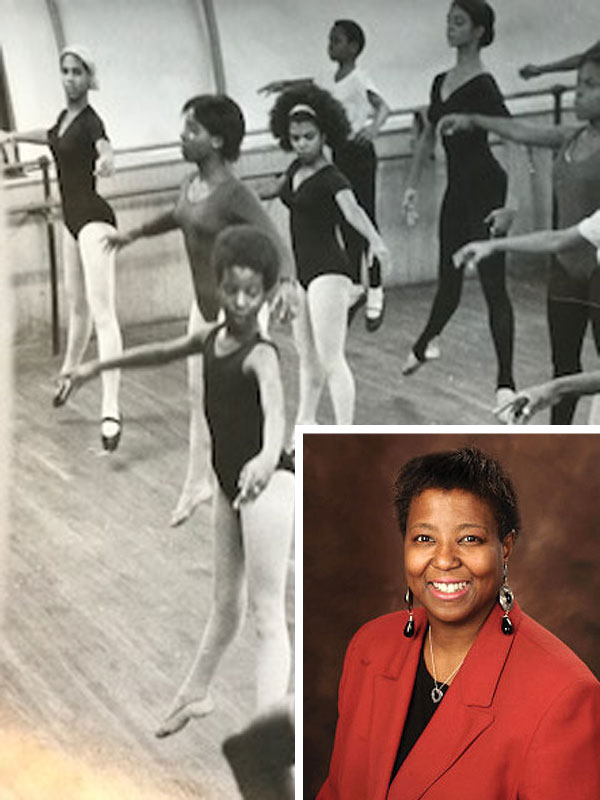10 Questions: Harvard Law's dean of students began as a ballerina

Photos of Marcia Lynn Sells courtesy of Harvard Law School.
When the Dance Theatre of Harlem was founded in 1969, it did more than prioritize African-American ballet dancers—it inspired them. That’s the effect the company had on Marcia Lynn Sells, a young dance student in Cincinnati. After attending a performance, she recalls seeing classical dancers who looked like her and who made her believe that she could achieve her dream of becoming a professional ballerina. In 1976, Sells moved to New York City and joined the Dance Theatre of Harlem under the direction of its co-founder, Arthur Mitchell. Fast-forward four decades and Sells is now dean of students at Harvard Law School, and her legal career has been as impressive and inspiring as any grand jeté.
You danced professionally with the Dance Theatre of Harlem for four years but left it behind to go to college and law school. How did you make that transition and why?
There was a moment when the film The Wiz was filming, and a number of Dance Theatre of Harlem dancers were performing in it, and the company went on hiatus. During that time, I had applied to Barnard College and had deferred. I come from a family of educators—everyone has a college degree. My mother said, “Maybe you should just call Barnard and say you’ll be around for a bit, and then if the company starts again, you can work your schedule around it.” I started at Barnard and fell in love with the school. When the company started back up again, I decided not to go back. After graduation, I went straight to law school. No one in my family was in the theater—my parents’ friends were all teachers, lawyers, doctors and educators, so it wasn’t a foreign thing for me to think about.
Tell me about your path to becoming a prosecutor.
There was a clinic started in my third year in law school called the Child Advocacy Clinic, and I thought, “This is what I want to do.” I was thinking I’d work in legal aid, but I had a friend who said, “You should be a prosecutor because you have the performative nature of the job and you are comfortable in your skin.” I had already been on stage much of my life! I joined the Brooklyn District Attorney’s Office in 1984, and I tried rape and child abuse cases. I loved the work, and I loved the job. When I say loved, it is from the standpoint of being able to make a difference in people’s lives. We worked in victims’ rights, and we helped advance changes in how rape was understood and prosecuted, like rape shield laws and having trauma-informed lawyers working with women and children. I worked with the lawyers who helped get the laws changed to outlaw marital rape.
You eventually joined Columbia University Law School as the dean of students, where you met David Stern, then the commissioner of the NBA, and landed the job of vice president of organizational development and human resources at the NBA. How did that happen?
David Stern was the graduation speaker, and I met him and he was teasing me about how long his speech would be. I said, “You know, you’re not the show—parents want to see their kids walk across the stage, and I am not paying overtime at Carnegie Hall.” He was impressed by that and asked the dean if I’d be interested in a job at the NBA. I thought, “How many times am I going to get offered a job in an area I never would have thought about?” When I talked to my dad, he said, “Are you kidding me? You can’t not take this!”
What did you do for the NBA?
It was similar to being dean of students: looking at people and their lives and career choices. It was an amazing, amazing time. The WNBA was starting, and I ended up being its head of human resources. The WNBA is owned as a partnership with the owners of the NBA teams, so we had to construct human resources for an entire league instead of having every team running as its own business. We also started the NBA store. I didn’t know anything about retail and what kind of HR structures you needed for that, and for a short time we created NBA City at Universal Studios Orlando. I was there when Golden State Warriors player Latrell Sprewell choked his coach. I still remember thinking, “If any other employee came up and choked their boss in the office, what would you do? Is that a human resources matter?”
This article was published in the January 2018 issue of the ABA Journal with the title "Dance Moves: Harvard Law’s dean of students began as a ballerina before leaping into law."
Write a letter to the editor, share a story tip or update, or report an error.


